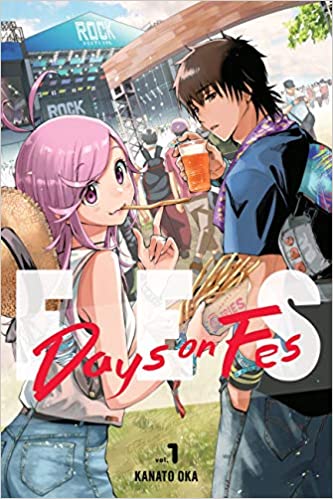Fictional bachelor dads come in two flavors. The first is easily flummoxed by diapers, sippy cups, tantrums, and stomach aches, reacting in abject horror to bodily functions and extreme emotions (see Three Men and a Baby), while the second behaves more like a stand-up comedian than an engaged parent, commenting wryly on his charges’ behavior without doing much to guide or correct them (see Yotsuba&!). Daikichi, the singleton hero of Bunny Drop, is a pleasant corrective to these familiar stereotypes: he’s a sensitive, well-meaning thirty-year-old who steps up to the plate when his grandfather dies, leaving behind an illegitimate six-year-old daughter.
What begins as an impulsive decision — Daikichi is offended by his family’s reluctance to accept responsibility for gramps’ kid — quickly evolves into a serious commitment. Daikichi is humble enough to realize his limitations as a father, enlisting help from co-workers, friends, and family members in his efforts to find day care for Rin and impose some structure on her life, even though he isn’t entirely certain what kind of boundaries and routines are appropriate for a six-year-old. Yumi Unita wrings some humor out of Daikichi’s attempt to understand Rin’s unique point of view, but steers clear of easy laughs and easy victories. The early moments of rapport between Daikichi and Rin feel earned, not contrived, while Rin’s quirks reflect the bizarre circumstances of her early upbringing, as well as her deep fear of being abandoned.
Though Unita’s character designs are highly stylized and her panels free of busy detail, the spare, unfussy quality of her artwork is deceptive; her seemingly simple faces and bodies actually speak volumes about each character’s personality and history. The few lines on Daikichi’s face, for example, not only establish his age and his homeliness, they also give readers a window into his relationship with Rin. We see his growing attachment to the girl through the softening of his brow and jawline, and note the tension in his face when trying to negotiate new office hours for himself. (His co-workers are puzzled and angered by Daikichi’s decision to take care of Rin. “Just because it’s a relative’s child,” one underling complains, “why must you be the sacrifice, Kawachi-San?”)
With Rin, Unita focuses as much on the character’s body language as on her facial expressions. In the first volume, Rin appears closed off from everyone: rounded shoulders, downcast eyes, pursed lips, and folded arms. As Rin begins to trust Daikichi, however, her face and posture change: her limbs unfurl and her eyes brighten, and her repertory of faces soon includes pouty defiance and bravado. That same attention to detail extends to supporting cast members as well. Rin’s mother, whom Daikichi meets in volume two, comes across as impossibly young, swimming in an outfit too big for her slight frame, and fidgeting throughout her conversation with Daikichi, twisting her hair and avoiding eye contact in the manner of a sullen teenager.
The introduction of Rin’s mother suggests that future installments of Bunny Drop will continue to focus complex issues — what constitutes a family? who has the right to call himself a parent? what’s in the best interest of a damaged child? — in lieu of sitcom ones. (See sippy cups, bad dreams, and the stomach flu, above.) That Unita can take such potentially overwrought material and fashion a thoughtful, funny, and honest look at child-rearing is testament to her skill as a storyteller and — one suspects — as a parent. Easily one of 2010’s best new titles.
BUNNY DROP, VOLS. 1-2 • BY YUMI UNITA • YEN PRESS • RATING: TEEN (13+)




Those are some really good observations about the art. I can see it being easy to write off the art as merely serviceable to the story, but that’s also forgetting just how much of the storytelling the art is really carrying on its shoulders. Some of the most informative scenes, some of my favourite, had barely any text if at all. It’s one of those great manga that I’m sure I could have understood perfectly without the benefit of a translation.
I heard that the story takes a sudden turn that might leave a lot of your questions at the end unanswered though. I’m not sure if it’s a spoiler or not, so I’ll keep quiet.
I recently came across your site and I’m happy to see someone with similar tastes. As for Usagi Drop/ Bunny Drop, a friend of mine had recommended it to be prior to its license, and this mini review further cements my decision to check this manga out. So thank you for sharing your thoughts.
I was going to ask how you feel about Hot Gimmick, but I see someone else has asked this already. So that only leaves me with one other manga: the insanely popular, Fruits Basket. I am really curious about how you feel about it. Mainly because I want to see whether I am the only human being in existence you cannot stand it. 🙂
By the way, I can’t seem to comment on older posts. Do you lock comments after a certain period?
@Jade: Thanks! I don’t normally pay that much attention to the artwork in this kind of story, but when I was re-reading the first volume, I was really struck by Rin and Daikichi’s physical transformations. As for the ending… I see that the series is up to eight volumes, so I’m guessing at some point we move beyond day care issues! I appreciate your restraint about spoilers!
@Joanna: Glad to hear it! I admit I’m not a big Fruits Basket fan; I’ve started it three time and never made it past the third volume. I didn’t think it was bad, just not my thing. The basic premise was interesting, but I found the heroine a little too tepid for my tastes. De gustibus non disputandum est, I guess!
Re: comments. I had a lot of difficulty with the comment settings on my blog about a month ago, so I have left older posts closed for right now. I’m going to be doing some major work on the blog in late December/early January, however, and hope to make those older posts accessible to folks who want to add their two cents to the discussion.
It’s not that I’ve read any more than you have, there was just a commenter spoiled it for me on another review, haha.
Speaking of, I’m glad you didn’t mention the big twist for Cross Game in its slot on the top ten list. I’ve been seeing a lot of reviews that mention it in the second or third sentence and it bugs me because the shock was really done well in context, I was floored when I first read it.
I’m glad to hear you’ll open up some older comments too, I was all ready to post my illuminating thesis on Neko Ramen earlier and, OMG, I could not!
@Jade: One of the reasons I haven’t reviewed Cross Game is that I didn’t want to address the big twist in volume one. I agree with you: Adachi handled it beautifully, and I was genuinely surprised by what happened. I just couldn’t figure out how to discuss it without giving away the secret. Once another volume is released, I might try again to review it.
As for comments, yes, I’m working on it! I’ve had some difficulties with the site that I hope to fix over the Christmas break, when I have a little more free time. Thanks for being patient!
Bunny Drop is really touching with just the simplest of scenes. The part that got me the most was when Daikichi asks Rin if she wants him to become her dad, and she just responds that she likes “Daikichi as Daikichi.” I wasn’t the biggest fan of her art most of the time, since I felt like she drew some people inconsistently (I felt like Gotou-san’s eyes kept changing size), but I loved all the little details she fit in, like the hair-twisting.
As for spoilers on Cross Game, I agree that too many people are giving the big twist away, since discovering it yourself is what really sucks you into the manga. I think it’s possible to write a review without spoiling that—heck, I even did it, though I don’t think I managed to get across how big of a punch it is. I’m sure you could do a great job of it =)
@Katherine: How strange! I gave up at volume 3 as well (and sold off the manga). And hurray I found someone else who does not like this manga! All my friends that like shoujo manga, either love this manga or like it. I agree with you that the heroine is much too passive and hence why I dislike her, but I also found the supporting characters and story to be dull as well. The curse was interesting, but it took such a back seat in the story that I had forgotten about it and gotten bored with the rehashed shoujo conventions each chapter introduced. Which in turn made me wonder why something, which was so mediocre, was so popular. The usual answers I got were either the guys or Tohru. But this would not be the first time I dislike popular shoujo manga, most of the stuff I really enjoy isn’t popular. 🙁
And sorry for going off topic. I promise this is the last you shall hear of Fruits Basket.
@Joanna: That’s OK — I’m relieved to know that other folks had the same reaction to FB as I did!